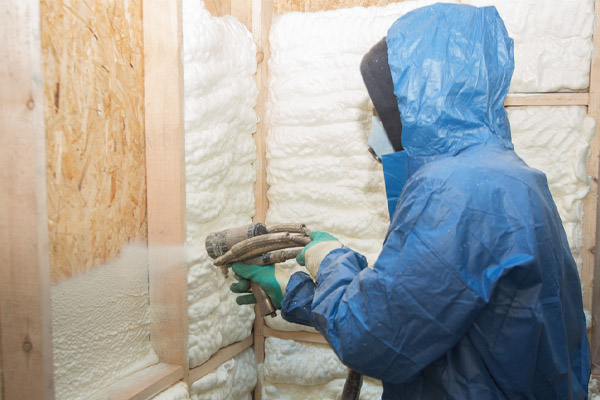What’s The Difference Between Open Cell & Closed Cell Spray Foam In Colorado Homes?

If you need to insulate your home, then you may have considered spray foam. After all, it is one of the best materials for resisting heat flow. It also creates an air barrier for enhanced energy efficiency and indoor air quality. However, there are two types of spray foam: open cell vs closed cell foam. Although they share many similarities, they have unique properties that should be taken into account when choosing spray foam insulation for different applications. Read on to learn more about them.
Open Cell & Closed Cell Spray Foam: How Are They Different?
Contents
- Open Cell & Closed Cell Spray Foam: How Are They Different?
- Choosing the Best Spray Foam Insulation for Various Applications In Fort Collins
- FAQs: Spray Foam Insulation in Colorado Homes
- How Does Spray Foam Perform in Extreme Colorado Weather Conditions?
- Can Spray Foam Be Used in Historic or Older Homes in Fort Collins?
- Is Spray Foam Insulation Eco-Friendly?
- Can Spray Foam Be Used Alongside Other Types of Insulation?
- How Long Does Spray Foam Insulation Last?
- Does Spray Foam Improve Indoor Air Quality?
- What Are the Safety Considerations When Installing Spray Foam?
- Can I Apply Spray Foam Insulation Myself?
- Conclusion
- Contact Ascend Construction for Trusted Insulation Services in Fort Collins, Colorado
In this Ascend Construction article, we discuss the differences between these two types of spray foam.
Spray Foam Cell Structure
Their names point to the appearance of small bubbles that make up these insulating materials. In the open cell spray foam type, the air bubbles have room left inside. This creates a softer and more flexible foam. Water may pass through, but retention is minimal and shape is maintained. Insulating properties won’t be compromised. In the closed-cell type, the bubbles have no space left. They are pressed together to create a rigid foam that blocks air and moisture. Structural integrity is superior.
Spray Foam Insulation for Ultimate Comfort: Enhance your home’s energy efficiency with Ascend Construction’s expert spray foam insulation services. Call us today!
Density Of Spray Foam
Due to their cell structures, open-cell foam has a lower density than closed-cell foam. The difference is significant. It’s about 0.5lbs per cubic foot compared to 1.75 to 2.2lbs per cubic foot. The high density also makes closed-cell foam about 3 to 4 times heavier than open-cell foam.
R-Value Of Spray Foam Insulation
The R-value indicates a material’s resistance to heat flow. The greater the resistance, the better the insulation. Closed-cell foam is superior to open-cell foam in terms of R-value, with numbers ranging from 6 to 7 per inch compared to just 3.5 per inch. Homeowners should consider the recommended R-value for different regions of the US to see whether open cell foam would suffice or not.
Open Cell vs Closed Cell Foam Solutions: Choose the right insulation for your Colorado home with Ascend Construction’s professional guidance. Contact us now for a consultation!
Expansion
When installing spray foam, think about how the material will expand. The closed-cell foam expands to roughly an inch of thickness when sprayed. It is possible to add more layers to increase the total R-value, for as long as the space allows it. On the other hand, open-cell foam expands to 3 inches when sprayed. Most walls can only handle one application of this material, further limiting its potential for heat resistance. Spray foam expansion is a factor to consider.
Spray Foam Insulation Cost

The two types of spray foams have different foam installation costs. Given the same amount of space, you will need more closed-cell foam for complete coverage because of its higher density. Multiple layers may be necessary, which means more time and higher labor costs. Consider all of these when budgeting for the insulation. Open-cell foam is cheaper per unit weight and is likely to involve only a single layer of insulation. You can save a lot of money with it.
Affordable Insulation for Every Budget: Ascend Construction offers cost-effective insulation solutions tailored to your needs. Call today to get started!
Choosing the Best Spray Foam Insulation for Various Applications In Fort Collins
The right choice will depend on your priorities for your home insulation project. Write down what you want to achieve for clarity. What is your main concern? What are you willing to compromise on? Are there things beyond your control that are forcing your hand to choose one over the other? Have realistic goals to make better decisions. Below are a few situations that illustrate how you can make your selection.
Building Code

Every structure must adhere to the local building codes. These are rules that ensure the safety and comfort of the home’s occupants. If the building code in your area calls for a high R-value, you may need to get closed-cell foam to adhere to it. Open-cell foam only has half the R-value for an inch of thickness, and the expansion of this material makes it difficult to apply it more than once on standard walls.
Boost Your Home’s Energy Efficiency: Reduce heat loss and improve indoor comfort with Ascend Construction’s high-performance spray foam insulation. Reach out now!
Spray Foam Budget Allotment
If the application is not too sensitive to the R-value, then both types would be viable. You will have to check other factors that may influence your decision to go one way or the other. For example, you might have a tight budget for the insulation because there are other home improvement projects that you need to think about. You can save a significant amount of money by opting for open-cell foam. Both material and labor costs are cheaper.
Environmental Conditions

Will the foam be sprayed on the building exterior? Is it in a location that is likely to get a lot of moisture exposure? Then you will have to prioritize water tightness. Closed-cell foam is the ideal choice in this case because it will shrug off water and keep it out of the building. You won’t have to worry about water retention and its accompanying issues.
Site Accessibility
A home with odd-shaped rooms will have lots of nooks and crannies that are difficult to reach. It is difficult to insulate their surfaces. Spray foam is the ideal solution because the nozzles can go to tight spaces. To be more specific, open-cell foam is better than closed-cell foam in this case because of its greater rate of expansion. It can seal hard-to-reach areas more effectively.
Professional Insulation for Hard-to-Reach Spaces: Let Ascend Construction insulate even the trickiest areas of your home with precision. Contact us to learn more!
Sound Dampening

Insulation can help in reducing the amount of sound that passes through a wall. Among spray foams, the open cell type can perform better in sound dampening because of its thicker, softer, and low-density material. Just remember that this cannot provide complete soundproofing. You will need to add special sound barriers and noise absorbers to achieve this.
FAQs: Spray Foam Insulation in Colorado Homes

How Does Spray Foam Perform in Extreme Colorado Weather Conditions?
Spray foam insulation performs well in Colorado’s varying climate. Closed-cell spray foam is particularly effective in areas with extreme temperatures due to its high R-value and water resistance. It creates a superior air barrier that minimizes heat transfer, helping to keep homes warm in winter and cool in summer. Open-cell spray foam, while providing good insulation, is better suited for indoor applications where moisture exposure is minimal.
Can Spray Foam Be Used in Historic or Older Homes in Fort Collins?
Yes, spray foam insulation can be used in historic or older homes, but special considerations are necessary. Open-cell foam is often recommended for retrofitting because of its flexibility and ability to expand into tight spaces. However, homeowners should consult with local building inspectors to ensure compliance with regulations and to prevent moisture issues in older wall systems.
Is Spray Foam Insulation Eco-Friendly?
Both open-cell and closed-cell spray foam can contribute to energy savings by improving thermal performance, which reduces the need for heating and cooling. Some manufacturers offer low-VOC (volatile organic compound) and water-blown spray foams, making them more environmentally friendly. Additionally, spray foam can last for decades, minimizing the need for frequent replacements.
Can Spray Foam Be Used Alongside Other Types of Insulation?
Yes, spray foam can complement other types of insulation. For example, you might use spray foam in hard-to-reach areas and traditional fiberglass batts in more accessible spaces to balance performance and cost. This hybrid approach can enhance overall energy efficiency while keeping expenses manageable.
Insulation That Meets Local Building Codes: Ensure your home complies with regulations while staying warm and efficient. Trust Ascend Construction—call today!
How Long Does Spray Foam Insulation Last?
Spray foam insulation is highly durable and can last 20 to 30 years or more if properly installed and maintained. Closed-cell foam, in particular, offers excellent longevity due to its dense, rigid structure, which resists moisture and air infiltration over time.
Does Spray Foam Improve Indoor Air Quality?
Yes, spray foam insulation can improve indoor air quality by sealing gaps and cracks that allow dust, pollen, and pollutants to enter the home. Closed-cell foam is especially effective at preventing moisture-related issues such as mold growth. However, proper ventilation should still be maintained to ensure fresh air circulation.
What Are the Safety Considerations When Installing Spray Foam?
Spray foam insulation requires professional installation to ensure safety and proper performance. The application process involves chemical reactions that can produce fumes, so protective gear and ventilation are necessary during installation. Homeowners should leave the area until the foam has cured completely, typically taking 24 to 48 hours.
Can I Apply Spray Foam Insulation Myself?
While DIY spray foam kits are available, professional installation is strongly recommended. Proper mixing, spraying technique, and adherence to safety guidelines are crucial for optimal insulation performance. Mistakes during application can result in poor coverage, reduced efficiency, and even structural damage.
Conclusion
In the debate of open cell vs closed cell foam, the best insulation choice ultimately depends on your specific needs and circumstances. Each type of spray foam offers distinct advantages—open-cell foam excels at soundproofing and filling tight spaces thanks to its high expansion rate and flexibility, while closed-cell foam provides superior R-value and water resistance, making it ideal for extreme climates and exterior applications.
Budget, environmental exposure, and local building codes are key factors in the decision-making process. By understanding these differences and consulting with professional insulation experts, you can ensure that your Colorado home is insulated effectively, enhancing energy efficiency and indoor comfort for years to come.
Contact Ascend Construction for Trusted Insulation Services in Fort Collins, Colorado
When it comes to air sealing and insulation upgrades, selecting a provider with the right blend of expertise, reliability, and cost-effectiveness is crucial.
Ascend Construction is your go-to expert, offering a full suite of services, including insulation removal and installation, air sealing, energy audits, energy-efficient solutions, and whole-house fan installations.
Partner with Ascend Construction for top-tier service that exceeds expectations and delivers lasting results. Call us today to start your energy-saving journey!

Contact Ascend Construction for a free consultation today. We can provide you with practical solutions to address the problem areas in your Fort Collins home. All of our services are affordable, and our work is guaranteed. Click here to contact us, or click the button below to give Ascend Construction a call. We offer free, no-obligation, in-home consultations.
Ascend Construction
4115 County Road 19
Fort Collins, CO, 80524
(970) 420-5495
Related Articles:
- What You Need To Know About Stack Effect In Colorado
- How Often Should Insulation Be Reevaluated in Older Homes?
- Retrofitting Insulation: Best Practices for Older Homes in Fort Collins
- Preparing For The Big Chill: Insulation Tips To Transition From Fall To Winter
- Integrating Smart Tech with Insulation: Optimizing Residential Energy Use